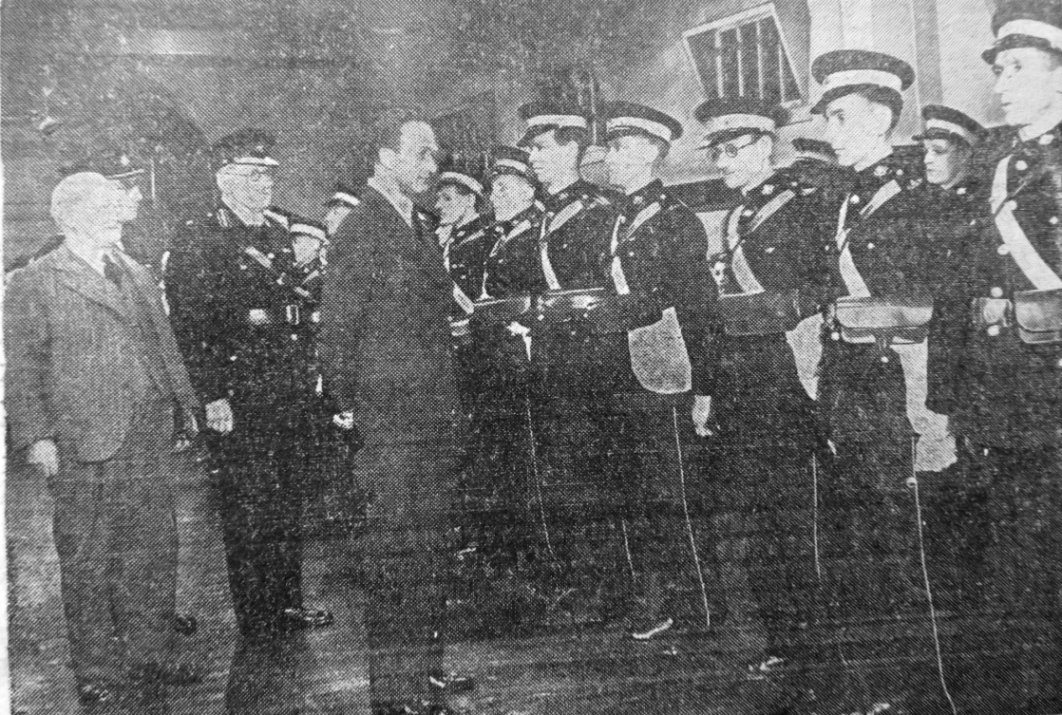South Yorkshire Times, November 20th 1943
Manvers Main Ambulance Competition
Chairman Inspects First Aid Personnel
Mr. O. J. Philipson, chairman of Manvers Main Collieries Ltd., inspecting ambulancemen at Manvers Main on Sunday.

Teams from the various divisions of Manvers Main Corps of the St. John Ambulance Brigade competed at Manvers’ Boys’ Club on Saturday for the Manvers Main Corps Ambulance Shield. The competition resulted in a win for Corps Superintendent Parker’s team (Manvers Main), with 155 points. Sgt.-Major Hargrave’s team (Barnburgh) came a close second, with 154 points, and the second Barnburgh team third, with 140 points. Assistant Commissioner Dr. J, J. Huey was judge. Running simultaneously was a Nursing Division team competition for the Forrest-Hamilton Ambulance Trophy and a Nursing Cadet individual competition for the Cadet Cup.
The three contingents were inspected by Mr. O. J. Philipson, (Chairman of Directors, Manvers Main Collieries, Ltd., and President of the Corps), accompanied by Mr. A. T. Thomson (director), Assistant Commissioner Huey, and Corps. Supt. E. Soar.
Mr. Philipson congratulated the parade on a smart turn-out. He knew from Mr. Soar that they were working under difficulties. Many of them had undertaken some of the duties which had to be performed by the civilian population in war-time, and it was a great credit to them that they had kept together in the Corps. He thought that the people who were foolish enough to think there could not be an emergency in this country ought to be locked up. They were a menace. There might be an emergency at any time, whether created by bombs or anything else. The great thing to his mind, was that people like those in the parade had given their time to be fully trained. He was perfectly certain that if an emergency came, they would be the first, in one way, to welcome it and show readiness to get down to work. He could tell them, from experience, that fully-trained personnel were worth something in an emergency, but half-trained personnel were worth nothing. It might seem to some of them that war was rather far removed from this area, but that was only by good fortune, Modern warfare was no pleasant thing for anybody.
“I sometimes think that we British people living in this small island are perhaps too modest. Many people will only realise what we have done when the history of the war is written. No other country in the world would have achieved what we have done. I cannot imagine the Germans capable of an evacuation like Dunkirk, when every Tom, Dick, and Harry arrived to take the Army away. I cannot imagine another race who would have been able to keep the seas open as we have done. In addition, we have won the Battle of Britain. The Army has done wonderful things, too. In the early days they had nothing to fight with and there is nothing worse than that. The Services have shown what they can do, but you who may be rather out of that side of it, should not feel despondent; you are doing an equally good job of work. You are trained and if an emergency comes, you are ready.”
He hoped that the war would be over by the next annual inspection, and that the limitations the war had placed on their activities would be removed. The Manvers Company appreciated all they did to the full and they could be certain that the Company would not only be interested in what they did, but would support them to the best of their ability.